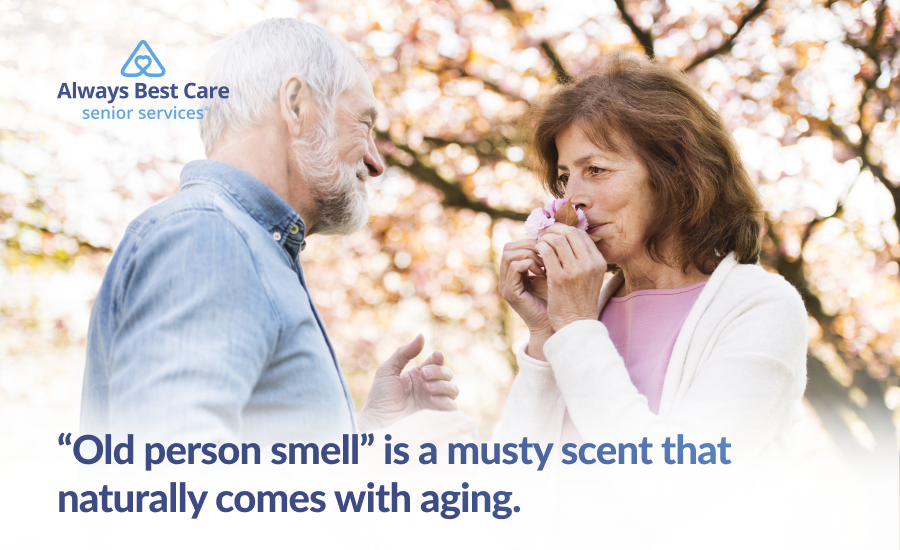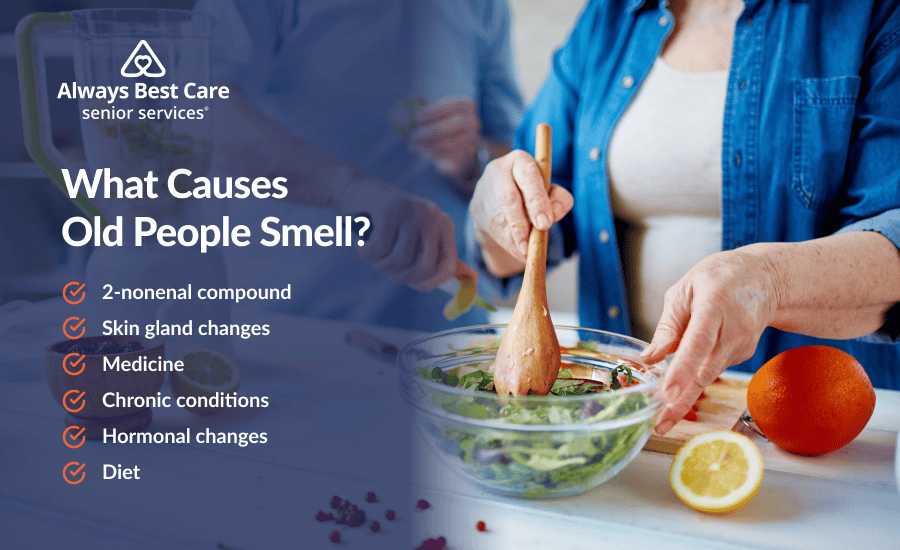What Causes “Old People Smell” and How Can You Manage It?

Table of Contents
“Old Person Smell” Explained: Key Takeaways
- “Old person smell” is a common and harmless scent that some individuals notice as their loved ones get older
- As we get older, body odor can shift due to natural changes in skin chemistry, hormones, medications, health conditions, and diet
- “Old person smell” might be a natural part of aging, but that doesn’t mean you can’t manage it
Have you ever walked into your elderly parent’s room or even a well-kept senior living community, and noticed a faint, musty scent?
It’s easy to assume it’s a sign of poor hygiene. But in many cases, this odor is simply part of the natural aging process, not a reflection of how clean your loved one is.
Understanding where “old person smell” comes from, and how it relates to other common changes in the body, can help you provide thoughtful, confident, and compassionate care for your aging loved one.
By the end of this guide, you will:
- Recognize what causes the subtle scent often associated with aging and why it’s completely natural
- Understand the biological and lifestyle factors that contribute to this change in body odor
- Learn practical, respectful ways to manage it while supporting your loved one’s comfort and dignity
- Explore how Always Best Care Senior Services can provide personalized care for your elderly loved one
What Is Nonenal Odor or “Old People Smell”?
Nonenal odor, also known as “old person smell” or “old people smell”, is a harmless scent that is associated with the elderly. It is often described as having a greasy, pungent, and musty odor.
What Age Does “Old People Smell” Start?
“Old person smell” isn’t tied to a specific age, but it can begin as early as 40.
That’s when the body might start producing more 2-nonenal, a compound linked to aging-related scent changes.
Other factors like diet, medications, and overall health can also play a big role in when this scent appears and how noticeable it becomes.
Why Do Old People Smell?
Curious about what causes aging body odor? Let’s explore the different factors that can contribute to this unique scent.
1. 2-Nonenal Compound
As people age, their skin starts producing more of 2-nonenal, a chemical compound that has a distinct grassy and greasy scent, which is also a key component of buckwheat and aged beer.
2. Changes in Skin Glands
The function and composition of skin glands, including sweat and sebaceous glands, can change with age.
3. Medicine
When combined, certain medications such as pseudoephedrine, opioids, or thyroid medications, can alter body odor.
For instance, taking antibiotics with antidepressants can disrupt gut bacteria or affect liver enzymes, resulting in the release of unusual-smelling compounds through the skin or breath.
4. Chronic Conditions
Conditions such as uremia (a result of kidney failure), eczema, and diabetes can cause specific changes in body odor.
Uremia can lead to a urine-like smell due to the accumulation of waste products in the body, while diabetes can produce a sweet or acetone-like odor due to issues with sugar metabolism.
5. Hormonal Changes
Hormones can significantly influence body odor, as they regulate the secretion of sweat and sebum.
These hormonal changes can affect the skin’s moisture levels and its microbiome, which in turn can change how the skin smells.
For example, decreases in estrogen and testosterone levels can impact the body’s natural smell.
6. Diet
As metabolism slows with age, the body may take longer to process these foods, which, in turn, intensifies their impact on the body’s natural smell.
For example, consuming meals rich in spices, garlic, and onions can result in a stronger body odor, as they contain sulfur-like compounds that can mix with sweat and increase odor.

Tips on How To Get Rid of “Old People Smell”
While you might not be able to completely get rid of “old person smell,” you can still manage it. There are effective strategies you and your elderly loved one can use to minimize its presence and impact.
Here’s what you can do to help keep things fresh for your elderly loved one:
- Open windows to improve airflow and minimize odor buildup in your loved one’s home or care facility. You can also use a high-efficiency particulate air filter (HEPA) air purifier to improve the indoor air quality.
- Prepare meals that have less garlic and certain spices, such as cumin or curry, for your loved one. Consider incorporating fresh fruits into their diet to help eliminate toxins that can cause unpleasant odors.
- Wash your loved one’s clothes, bedding, and towels regularly using a mild, fragrance-free detergent. Ensure everything is completely dry before use because damp fabrics can trap and hold odors. You can also consider house cleaning for seniors to help maintain a clean, fresh environment throughout their home.
- Encourage your loved one to use gentle, fragrance-free soaps and moisturizers to cleanse and hydrate their skin. This skin care routine can also help minimize the production of odors while keeping the skin’s protective barrier intact.
- Encourage your loved one to use a washcloth or soft body brush to gently scrub away dead skin cells.
- Ensure your loved one changes their clothes daily, including socks and underwear.
- Motivate your loved one to maintain a healthy weight to reduce body odor since excess fat can contribute to it.
- Advise your loved one to practice balance exercises or relaxation techniques like yoga, meditation, or biofeedback to learn how to manage stress and reduce sweating.
- Make sure your loved one wears clothes made of linen, cotton, or wool, as these breathable fabrics can help reduce sweat and moisture buildup on the skin.
- Ensure your loved one uses deodorants to eliminate odor without stopping sweat. In addition, deodorants contain fragrances to mask any unpleasant odor.
- Schedule an appointment with your loved one’s healthcare provider if you notice changes in their odor. Your loved one’s doctor can consider adjusting the medication or suggest strategies to manage side effects, including those that affect body scent.
- Arrange regular medical check-ups for your loved one to help manage chronic conditions like diabetes and kidney issues, as these illnesses can impact the body’s natural smell.
- Make sure your loved one drinks plenty of water to help flush toxins from the body, potentially reducing the production of odorous compounds. A study found that elderly individuals should drink around nine to 13 cups, depending on their gender.
- Try natural remedies like baking soda or apple cider vinegar on odor-prone areas such as the feet or underarms.

Explore Senior Care Services to Help Your Loved One Manage “Old People Smell” & More
Dealing with unpleasant smells as your loved one ages requires you to be understanding and patient.
At Always Best Care, our caring and skilled team is here to support you and your loved one throughout the challenging yet natural process of aging.
We provide professional care to ease aging-related discomforts like old person smell, incontinence, and other common issues.
Our top-notch elderly care services include:
- In-home care services: Our team provides uninterrupted care at home, including meal preparations, medication reminders, companionship, and personal hygiene services.
- Skilled home health care services: In certain areas, we offer expert care for chronic illnesses, tailoring plans to your loved one’s needs.
- Specialized home care services: We use high-tech tools like balance trackers, emergency response systems, and remote monitoring to continuously support your loved one’s health.
- Respite care services: Whether you need a caregiver for a short period or longer, we’ve got you covered. We can take care of your loved one while you focus on other responsibilities.
- Dementia care services: We offer compassionate care for your loved one with dementia, focusing on their safety, comfort, and well-being.
- Senior living referral services: Allow us to guide you to the best senior living options for your loved one.
- Veterans assistance program: We assist veterans in receiving financial aid for care, as our way of showing gratitude for their service.
“Old Person Smell”: FAQs
What is “old people smell?”
“Old people smell” is a term often used to describe a distinct, musty odor that can develop as people age.
While the term itself might sound judgmental, the scent has a biological cause and isn’t a reflection of poor hygiene.
What causes “old person smell” in the house?
“Old person smell” in the house often comes from the buildup of nonenal, a chemical that skin naturally produces more of as people age.
This substance, combined with inadequate ventilation, insufficient cleaning, and the presence of fabrics that can trap odors, contributes to the distinctive smell.
Regular cleaning, good hygiene, and proper ventilation can help reduce or eliminate this odor.
Does everyone experience “old man smell” the same way?
No, not everyone experiences “old person smell” in the same way. Individual sensitivity to smells, cultural perceptions, and personal experiences can significantly influence how one perceives this odor.
In addition, the intensity and character of the scent can vary from person to person due to differences in health, hygiene practices, and living environments.
How to prevent “old person smell”?
You can’t actually prevent old people from smelling. However, you can encourage your loved one to bathe regularly, wear breathable fabrics, and use fragrance-free soaps to manage unpleasant odors.
In addition, preparing a healthy diet rich in antioxidants, maintaining a clean living environment, and ensuring proper ventilation for your loved one can reduce the presence of musty odor.





